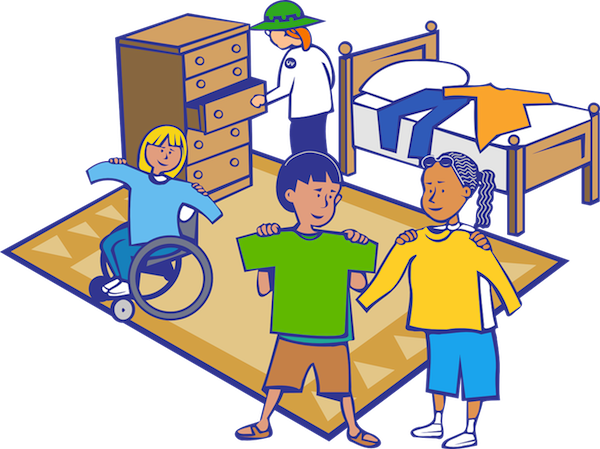If you’ve got a kid with special needs, it can be hard to find the right learning experiences and it can require extra work to make them accessible. (image from clker-free-vector-images (pixabay.com))
All Jewish kids deserve to have access to wonderful summer camp experiences. However, if you’ve got a kid with special needs, it can be hard to find the right learning experiences and it can require extra work to make them accessible. Every kid is different, so these tips are only a start, and from just one parent. Here’s to hoping your child has a great experience with Jewish camping, and that you do, too.
Start early. Finding the right situation takes research. For us, the best advice came from the parents of other special needs kids. Every special needs parent I’ve met wants to help others, as well. Taking care of a kid with challenges can be a struggle.
Even if your child isn’t ready for camp now, listen carefully, as advice may make it easier when the time comes. Starting early might mean gathering information years in advance or just signing up early in the new year to get into the summer program that is the best fit for your kid.
Ask for more information. Many camps say they work to meet every kid’s needs, but their program descriptions may not offer details. Contact the camp office to ask how they can meet your specific child’s needs. Be polite and detailed. The camp director should demonstrate professional competence that shows they can rise to any challenges that may occur.
Ask for a tour. If a child has physical disabilities or sensory challenges, for example, the physical environment can make or break the kid’s experience. Some places give lip-service to accessibility but haven’t tested it. Maybe a kid using a wheelchair can’t use the bathroom, or the hiking trails are too rugged for the wheelchair to manage. If a child uses an iPad assistive communication device that requires charging, check that the camp’s got adequate plugs to recharge it.
Walk through the grounds. Imagine your child on a camp day. If your child is open to it, bring the kid along. How will this environment work physically for him or her? Is it truly accessible?
Ask about professional supports. Many camps are staffed with eager but inexperienced young adults. These counselors are often full of energy and great ideas but many have never encountered special needs situations. Does this camp have a professional on staff who works with kids with challenges? Does this person have any training or experience?
In some school environments, even the teachers aren’t expected to have special education training. If it isn’t required at school, it may not be available at camp.
While professionals are essential, sometimes the best support can be an older student or even another parent who has experience with a sibling, child or friend with special needs. If the camp looks like a possibility, see if your child can be paired with an assistant who really knows what she or he is doing. Sometimes, you need to pay extra to get this help.
Good communication is key. A camp that doesn’t respond to questions isn’t likely to work out well. This is particularly true if your child isn’t verbal or can’t advocate for themself. You should feel reassured that, from start to finish, the camp is willing and able to connect with you, let you know about the successes and difficulties each day, and even ask you for advice about your kid.
It doesn’t have to be formal, it can be a few words at pick up and drop off, but communication needs to be good to keep your kid safe.
Ask if you can observe or drop in. If you can see camp in session, with or without your camper present, you may have a much better idea of whether it will work. For instance, a kid who is sensitive to noise may need accommodation to cope with common camp experiences like bunk cheers or song sessions, as these frequently offer an opportunity for over-the-top yelling. You cannot hear that noise unless you are there when the campers and counselors are, too.
Compromise. The best Jewish environment for your child may not be the one you planned on. If your family is traditional but the Reform day camp has the most accessible campus, you might choose that camp. Or, if your local Chabad provides the most supportive environment in terms of counselor/camper ratio, but you’re raising an egalitarian Conservative family, you may need to decide which values are most important. For many, there are the things that their special needs camper must have, and then there are many other compromises along the way. Do what is best for your child. Sort out the theological discrepancies later.
Trust your gut. Sometimes, we don’t have all the information in advance, but we know the people involved and their good relationship with our children. If you feel confident and trust those in charge, that’s a great start. On the other hand, if you get a bad feeling from an interaction, pay attention! Your child is dependent on the adults in charge at camp. If you doubt their ability to meet your kid’s needs, don’t sign up, or take your kid out of the camp.
Your kid (and every kid) is precious. Do your homework. A good camp is more than daycare. It’s powerful enrichment that boosts Jewish identity and enthusiasm for the whole year.
Joanne Seiff has written regularly for CBC Manitoba and various Jewish publications. She is the author of three books, including From the Outside In: Jewish Post Columns 2015-2016, a collection of essays available for digital download or as a paperback from Amazon. Check her out on Instagram @yrnspinner or at joanneseiff.blogspot.com.

